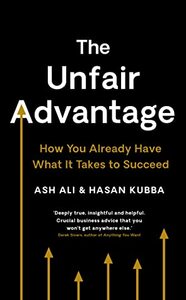You need to sign in or sign up before continuing.
Take a photo of a barcode or cover
49 reviews for:
The Unfair Advantage: How You Already Have What It Takes to Succeed
Ash Ali, Hasan Kubba
49 reviews for:
The Unfair Advantage: How You Already Have What It Takes to Succeed
Ash Ali, Hasan Kubba
informative
inspiring
reflective
fast-paced
informative
inspiring
slow-paced
Repetitive. Very very very repetitive. Actually tells the same stories about their personal live multiple times in the book without adding anything the second time they tell it. If the book was half the amount of pages it would be whole star higher.
inspiring
slow-paced
Nu aduce nimic nou în discuție față de ideile obișnuite din zona de business a dezvoltării personale.
Îmi doream să citesc o carte despre descoperirea și folosirea avantajelor nedrepte în viață, nu în contextul startup-urilor.
Îmi doream să citesc o carte despre descoperirea și folosirea avantajelor nedrepte în viață, nu în contextul startup-urilor.
informative
slow-paced
If you have not taken in other books on building your own business, start up, personal growth etc this would be a good fit. Personally it felt repetitive and full of obvious statements, it leaned heavily on stories of other people. Sprinkled in were a couple nuggets but I didn’t walk away feeling more enlightened.
Clearly different people have different advantages. Some obvious, others less so.
Read this as a ‘primer’ for learning about other peoples advantages and how that can help you move forward with your goals.
Clearly different people have different advantages. Some obvious, others less so.
Read this as a ‘primer’ for learning about other peoples advantages and how that can help you move forward with your goals.
informative
inspiring
medium-paced
hopeful
informative
inspiring
lighthearted
reflective
medium-paced
As an avid reader, I’ve come across countless self-help and business books, but “The Unfair Advantage” stands out for its refreshing perspective. Ash Ali, along with co-author Hasan Kubba, delves into the concept of unfair advantages—those unique elements that give us an edge over our competition.
What I Loved:
Practical Insights: Ali draws from his extensive experience, including being the first Marketing Director of Just Eat, to provide practical insights. He emphasizes that hard work and grit alone aren’t enough; understanding your unfair advantages is crucial.
Holistic Approach: The book goes beyond the usual suspects (like intelligence or money) and explores various dimensions: location, education, expertise, status, and even luck. It’s a holistic view that resonates with real-world scenarios.
Self-Reflection: Ali encourages readers to look inward and identify their unique strengths. By doing so, you’ll uncover hidden talents and resources you didn’t realize you possessed.
Readable and Concise: The writing style is clear, concise, and engaging. You won’t find yourself drowning in jargon or unnecessary fluff.
Room for Improvement:
More Case Studies: While the book provides examples, I would have loved to see more detailed case studies illustrating how individuals leveraged their unfair advantages successfully.
Dive Deeper: Some sections could benefit from deeper exploration. For instance, the chapter on luck left me wanting more.
Final Thoughts:
“The Unfair Advantage” is a thought-provoking read that challenges conventional wisdom. It’s not just for entrepreneurs; anyone seeking personal growth and success can benefit from understanding their unique advantages. So, whether you’re launching a startup or navigating your career, grab a copy and discover your hidden edge.
I deducted half a star due to the desire for more case studies and deeper dives. Overall, this book is a valuable addition to anyone’s personal development library.
What I Loved:
Practical Insights: Ali draws from his extensive experience, including being the first Marketing Director of Just Eat, to provide practical insights. He emphasizes that hard work and grit alone aren’t enough; understanding your unfair advantages is crucial.
Holistic Approach: The book goes beyond the usual suspects (like intelligence or money) and explores various dimensions: location, education, expertise, status, and even luck. It’s a holistic view that resonates with real-world scenarios.
Self-Reflection: Ali encourages readers to look inward and identify their unique strengths. By doing so, you’ll uncover hidden talents and resources you didn’t realize you possessed.
Readable and Concise: The writing style is clear, concise, and engaging. You won’t find yourself drowning in jargon or unnecessary fluff.
Room for Improvement:
More Case Studies: While the book provides examples, I would have loved to see more detailed case studies illustrating how individuals leveraged their unfair advantages successfully.
Dive Deeper: Some sections could benefit from deeper exploration. For instance, the chapter on luck left me wanting more.
Final Thoughts:
“The Unfair Advantage” is a thought-provoking read that challenges conventional wisdom. It’s not just for entrepreneurs; anyone seeking personal growth and success can benefit from understanding their unique advantages. So, whether you’re launching a startup or navigating your career, grab a copy and discover your hidden edge.
I deducted half a star due to the desire for more case studies and deeper dives. Overall, this book is a valuable addition to anyone’s personal development library.
hopeful
informative
inspiring
fast-paced
challenging
informative
inspiring
fast-paced
slow-paced



